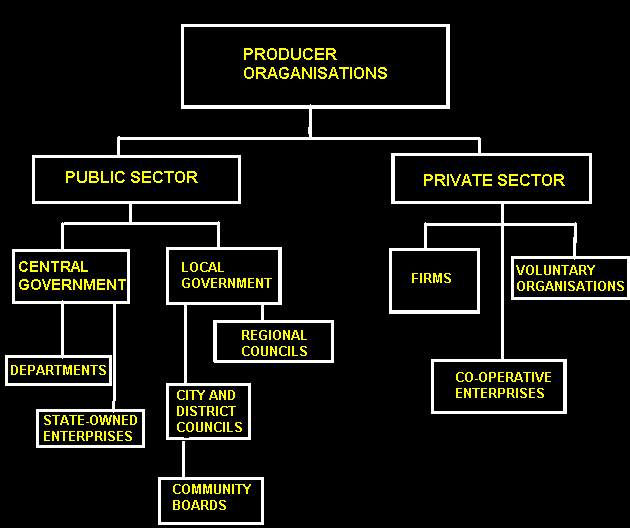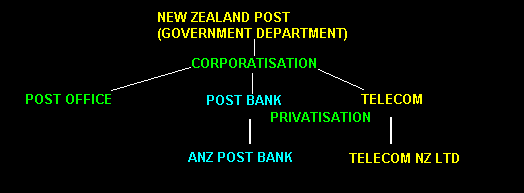| OBJECTIVES:
|
|
Economics is the study of Scarcity. Scarcity
means that there are not enough resources in the world to cover all of our
needs and wants. |
| We will be looking at how the problem of Scarcity is
solved and the problems that arise with the problem of Scarcity. |
| Production -
Production is the bringing into existence goods
and services. It
has there main elements to it.
Goods are tangible, something that we can touch. There are two main types of
goods. |
| Consumer goods
- |
| |
| There is an input
(a raw material) the input is processed
and then there is an output. |
INPUT - PROCESS - OUTPUT |
PEOPLE AS PRODUCERS AND CONSUMERSA
producer is someone who creates / provides a good or service to other
people. They are the managers and workers who supply the economy with the
goods and services it needs. Consumers
are people who use a good or service. People
are usually both producers and consumers. A mechanic is a producer when
they are fixing machines and cars etc. but they are a consumer when they
go to Mc Donalds and buy a Mega Feast.
|
|
|
Producers of goods and services receive wages or
profit i.e. if the owner works for him or herself. |
|
|
People use the wages or profit earned to pay for
goods and services from producers. | |
| INTERDEPENDENCE. |
| Interdependence means that people
rely on each other. |
| In the past people were
independent
- they produced all the goods and services they needed for themselves. |
| Now people rely upon other people
for all the goods and services that they don't create for themselves. This
is because in modern times people SPECIALISE
- they concentrate on the production of one
good or service and so they rely upon other people for the goods and
services they no longer provide. |
| SPECIALISATION
- this is where a firm or person
concentrates on the making of one type of good or service. |
| Both workers and firms specialise. |
| Workers specialise in a job and become good at it,
e.g. teacher, farmer, dentist, mechanic. They earn wages / salaries or profit which
they use to buy goods produced by other specialist workers. |
| Producers also specialise. Firms concentrate on
producing a particular type of good or service, e.g. cars, computers, education, or health services. They produce more than they
need for themselves, and sell this surplus in order to buy the surplus of
other specialist producers. |
| They are interdependent; workers buying from
other specialist workers and producers buying the surplus from other
firms. |
|
DIVISION OF LABOUR -
This is the further breaking up of the
production process into separate task. |
| |
|
Examples of
producers |
|
Farmers market showing both a
producer and consumer.
|

A fish market
|
|

A teacher |

Police |
|
|
| |
|
|
| |
| TYPES
OF PRODUCERS |
|
 |
| |
PUBLIC SECTOR |
|
The public sector
consists of both Central Government and Local Government. |
| Central
Government is a producer and provides goods
and services to the public. |
| The type of
goods provided can be divided into Private
and Collective goods. |
| (a) |
Private goods and services
which are sold for profit,
e.g. logs from government-owned forests, postal services by New
Zealand Post. |
| (b) |
Collective goods and services are supplied
free and paid for from taxes e.g. Police, National, Parks, main
roads. Firms could not make a profit by
supplying these needed services, so they are provided by the
Government. | |
| |
| Mixed goods are those provided partly by government
and partly by private firm's e.g. education has state schools and
private schools, health has public hospitals and private
hospitals. |
Another
reason for the government providing goods and services is that some goods
are Merit
goods and the government wants to encourage consumption of them.
These type of goods include:
Schools.
Hospitals.Demerit
goods are goods that are considered bad for us and consumption is
discouraged by the government. This can be done through placing taxes on the
good or regulating the production or consumption of them through the legal
system. Examples include:
Drugs.
Alcohol. |
|
|
| |
| Changes to Government Goods and Services |
| In the 1980s the New Zealand Government has changed the way
it produces goods and services because of claims of waste and
inefficiency. |
| |
Corporatisation State Owned Enterprises
(SOEs), e.g. New
Zealand Post.
Some Government Departments were set up to run like
private firms to make a profit. This was done to try and make the
Government Departments more efficient. the department were expected
to make a profit, where previously they were often losing
money. |
| |
Privatisation
Some
of the Government S.O.E.s' were eventually sold to private
companies. Companies such as Telecom were sold off to private
companies. The government often made a lot of money out of this. | |
 |
| |
| Local Government |
| Local councils look after collective goods such as water
supply, drainage, sewage, local roads, libraries etc. They are paid for by
rates. |
| Restructuring
in Local Government |
| Local
government has also gone through a process of restructuring. A lot of
council services have gone through a process similar to corporatisation and
are expected to make a profit.
Some council services have been turned into
L.A.T.E.'s or Local Area Trading Enterprises. These council owned
organisations are now expected to earn a profit. An example of this would be
Waste Management in Palmerston North, which looks after rubbish dumps and
other waste related services but is expected to earn a profit. Metrowater in
Auckland is another example. |
Private Firms |
| These produce most goods and services. They are
privately owned and aim to make a profit. They employ workers, own
land and buildings, machinery etc. and pay managers to organise the
production of the goods or services to sell at a profit. |
| |
Co-operative Firms
are special private firms
owned by producers or consumers.
Producers e.g. Diary
farmers can own together the local dairy factory they supply. The
factory employs workers and managers and distributes profits to the
dairy farmer owners. An example of a co-operative is Fonterra. This
is a large dairy co-operative which is owned by the suppliers of the
milk ( the dairy farmers).
Consumers can own shares in a large
shop and receive discounts on purchases and a share of the profit.
| |
| |
Voluntary Groups |
| These groups do not make a profit but help others with the
services they provide e.g. Church Groups, Clubs, World Vision, Salvation
Army. Voluntary organisations often
supply goods or services that a private firm may be unwilling to provide
because they would not be able to make a profit from providing the
commodity. |
| |